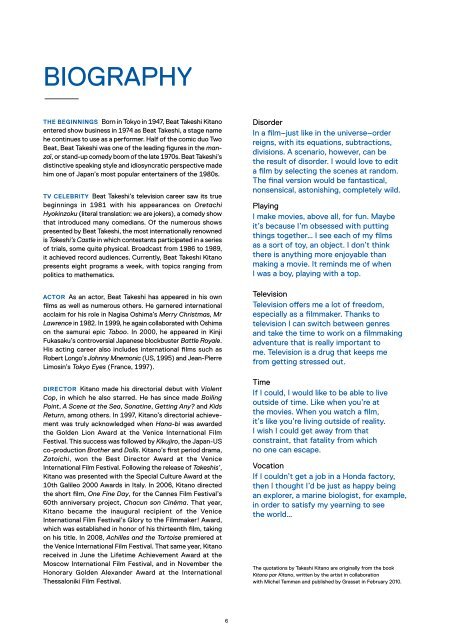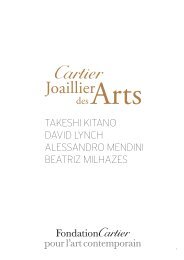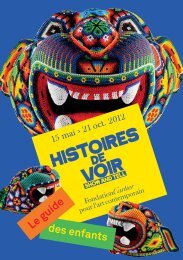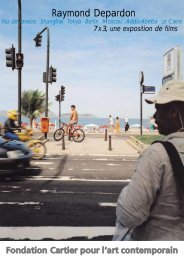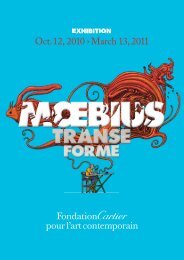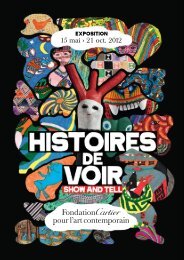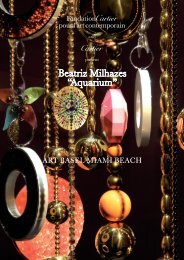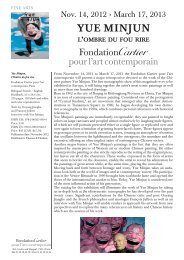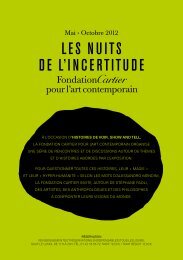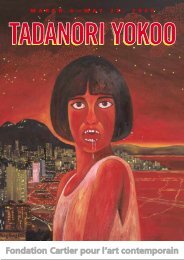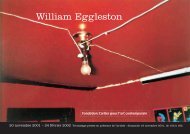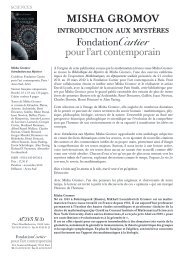March 11 ? Sept. 12, 2010 - Fondation Cartier pour l'art ...
March 11 ? Sept. 12, 2010 - Fondation Cartier pour l'art ...
March 11 ? Sept. 12, 2010 - Fondation Cartier pour l'art ...
Create successful ePaper yourself
Turn your PDF publications into a flip-book with our unique Google optimized e-Paper software.
BIOGRAPHY<br />
—<br />
the beginningS Born in Tokyo in 1947, Beat Takeshi Kitano<br />
entered show business in 1974 as Beat Takeshi, a stage name<br />
he continues to use as a performer. Half of the comic duo Two<br />
Beat, Beat Takeshi was one of the leading figures in the manzaï,<br />
or stand-up comedy boom of the late 1970s. Beat Takeshi’s<br />
distinctive speaking style and idiosyncratic perspective made<br />
him one of Japan’s most popular entertainers of the 1980s.<br />
tv Celebrity Beat Takeshi’s television career saw its true<br />
beginnings in 1981 with his appearances on Oretachi<br />
Hyokinzoku (literal translation: we are jokers), a comedy show<br />
that introduced many comedians. Of the numerous shows<br />
presented by Beat Takeshi, the most internationally renowned<br />
is Takeshi’s Castle in which contestants participated in a series<br />
of trials, some quite physical. Broadcast from 1986 to 1989,<br />
it achieved record audiences. Currently, Beat Takeshi Kitano<br />
presents eight programs a week, with topics ranging from<br />
politics to mathematics.<br />
ACtor As an actor, Beat Takeshi has appeared in his own<br />
films as well as numerous others. He garnered international<br />
acclaim for his role in Nagisa Oshima’s Merry Christmas, Mr<br />
Lawrence in 1982. In 1999, he again collaborated with Oshima<br />
on the samurai epic Taboo. In 2000, he appeared in Kinji<br />
Fukasaku’s controversial Japanese blockbuster Battle Royale.<br />
His acting career also includes international films such as<br />
Robert longo’s Johnny Mnemonic (uS, 1995) and Jean-Pierre<br />
limosin’s Tokyo Eyes (France, 1997).<br />
direCtor Kitano made his directorial debut with Violent<br />
Cop, in which he also starred. He has since made Boiling<br />
Point, A Scene at the Sea, Sonatine, Getting Any? and Kids<br />
Return, among others. In 1997, Kitano’s directorial achievement<br />
was truly acknowledged when Hana-bi was awarded<br />
the Golden lion Award at the Venice International Film<br />
Festival. This success was followed by Kikujiro, the Japan-uS<br />
co-production Brother and Dolls. Kitano’s first period drama,<br />
Zatoichi, won the Best Director Award at the Venice<br />
International Film Festival. Following the release of Takeshis’,<br />
Kitano was presented with the Special Culture Award at the<br />
10th Galileo 2000 Awards in Italy. In 2006, Kitano directed<br />
the short film, One Fine Day, for the Cannes Film Festival’s<br />
60th anniversary project, Chacun son Cinéma. That year,<br />
Kitano became the inaugural recipient of the Venice<br />
International Film Festival’s Glory to the Filmmaker! Award,<br />
which was established in honor of his thirteenth film, taking<br />
on his title. In 2008, Achilles and the Tortoise premiered at<br />
the Venice International Film Festival. That same year, Kitano<br />
received in June the lifetime Achievement Award at the<br />
Moscow International Film Festival, and in November the<br />
Honorary Golden Alexander Award at the International<br />
Thessaloniki Film Festival.<br />
6<br />
Disorder<br />
In a film–just like in the universe–order<br />
reigns, with its equations, subtractions,<br />
divisions. A scenario, however, can be<br />
the result of disorder. I would love to edit<br />
a film by selecting the scenes at random.<br />
The final version would be fantastical,<br />
nonsensical, astonishing, completely wild.<br />
Playing<br />
I make movies, above all, for fun. Maybe<br />
it’s because I’m obsessed with putting<br />
things together… I see each of my films<br />
as a sort of toy, an object. I don’t think<br />
there is anything more enjoyable than<br />
making a movie. It reminds me of when<br />
I was a boy, playing with a top.<br />
Television<br />
Television offers me a lot of freedom,<br />
especially as a filmmaker. Thanks to<br />
television I can switch between genres<br />
and take the time to work on a filmmaking<br />
adventure that is really important to<br />
me. Television is a drug that keeps me<br />
from getting stressed out.<br />
Time<br />
If I could, I would like to be able to live<br />
outside of time. like when you’re at<br />
the movies. When you watch a film,<br />
it’s like you’re living outside of reality.<br />
I wish I could get away from that<br />
constraint, that fatality from which<br />
no one can escape.<br />
Vocation<br />
If I couldn’t get a job in a Honda factory,<br />
then I thought I’d be just as happy being<br />
an explorer, a marine biologist, for example,<br />
in order to satisfy my yearning to see<br />
the world…<br />
The quotations by Takeshi Kitano are originally from the book<br />
Kitano par Kitano, written by the artist in collaboration<br />
with Michel Temman and published by Grasset in February <strong>2010</strong>.


